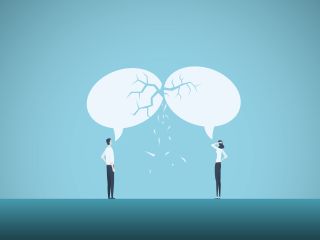Gaslighting
Gaslighting and Neurodiversity
Why people who are neurodivergent may be falsely accused of gaslighting.
Posted March 1, 2024 Reviewed by Tyler Woods
Key points
- People who are neurodivergent are easily misunderstood and misrepresented.
- Communication differences can lead to miscommunications.
- Gaslighting denies a person's reality and is marked by a desire to control, shame, and cause harm.
- People with good intentions will work to respectfully resolve relationship and communication differences.
Gaslighting has become a widely used term, but it seems to be easily misappropriated, misunderstood, and, in my experience, often used to abuse and control other people. In this article, I will explore how people accuse neurodivergent people of gaslighting and why this might be due to their communication differences, styles, and preferences.

It is possible to respectfully criticise or disagree with someone without wading into the malicious world of gaslighting. In my experience, understanding the intentions behind communication is the marker of whether someone is gaslighting you or not. The desire to resolve conflicts and honestly disagree is another clear indicator of whether the other party intends to humiliate and dominate someone or whether they want to connect with a person genuinely.
For many of us on the spectrum, particularly those diagnosed later in life, we have had many of our experiences denied throughout our lives, as our experiences often do not jibe with what others deem 'normal.' Many of the clients I work with have reported instances in which they have been told they are wrong when explaining how they feel or experience the world, and that their reality and perspective have been discounted and discredited, most often by family members or health professionals.
The topic of gaslighting brings up important questions about both memory and reality. Memories are fallible and not always factual or accurate, and reality and perspectives are subjective. Our perception of reality may diverge from someone else's, even if we have experienced the same events, situations, or relationships. If someone does not recall an event in the same way you do, that is not gaslighting. If someone objects to a recollection, that is not necessarily gaslighting either. I have seen many people confuse being triggered by a comment or feeling uncomfortable when communicating with people who are neurodivergent as them "gaslighting."
I recently had an unpleasant experience with a person who accused me of gaslighting them when I did not support their narrative and their memories of me from years ago. I found this exchange both disconcerting and confusing, as I couldn’t understand why they brought this subject up, and because what they were saying did not reflect the way I think or feel. This is not a unique experience for many of the neurodivergent, including autistic, people I work with. We are easily misunderstood, and we can trigger and upset people accidentally. That is how these conditions and communication differences impact social interactions, and it can be sad and frustrating for everyone involved.
Our disabilities are related to communicating and relating to others differently, but many people struggle to accept and respect these differences. The best relationships for me are with those who understand how I am divergent and how that impacts my verbal and non-verbal communication. Without accommodating my disability, misunderstandings will invariably occur. The struggle is real. And it is exhausting, unfair, and often ridiculous, to be honest. It often doesn’t take much for people who don’t care about or respect us to get offended by how we communicate and punish us with their emotional reactions and responses.
Neurodivergent people, particularly autistic and ADHDers may be at greater risk of being victims of gaslighting because of our communication differences, styles, and preferences (Douglas and Sedgewick, 2023, Pearson et al., 2022). This means we are vulnerable to being bullied, shamed, and abused if the other party feels they have been wronged or slighted (Gibbs and Peliconi, 2023).
It seems that people with healthy egos and good self-esteem are less likely to internalize or take everything that is said personally if it is delivered too directly, or can come across as harsh or blunt on occasion. They might ask clarifying questions to understand our core values and intentions.
On the other hand, if someone closes discussion and dialogue down completely and denies your experiences and perspective while exhibiting no respect or sensitivity towards you and your communication style and preferences, then chances are, you are being subjected to gaslighting.
We all experience the world differently. We all hear, interpret, and process information through our unique lenses. This is true for neurotypical people, as well. Our realities are influenced by our level of education, our careers, our significant relationships, our interests, our passions, our experiences, and other variables. If we disagree, or if someone feels unheard and upset, that does not necessarily mean that gaslighting has occurred. The test gaslighting test may be whether resolution and respect can navigate the situation to a healthy ending.
People who love and respect you care about how they make you feel. Those who want to win, dominate, and succeed at all costs may be expert gaslighters. Those with good intentions will generally be comfortable with dialogue and will be patient. Those without good intentions may behave rather differently. Learning and knowing the difference has been helpful for me and so many of the people I work with.
References
Douglas, S. and Sedgewick, F., 2023. Experiences of interpersonal victimization and abuse among autistic people. Autism, p.13623613231205630.
Gibbs, V. and Pellicano, E., 2023. ‘Maybe we just seem like easy targets’: A qualitative analysis of autistic adults’ experiences of interpersonal violence. Autism, p.13623613221150375.
Pearson, A., Rees, J. and Forster, S., 2022. “This was just how this friendship worked”: Experiences of interpersonal victimization among autistic adults. Autism in adulthood, 4(2), pp.141-150.




